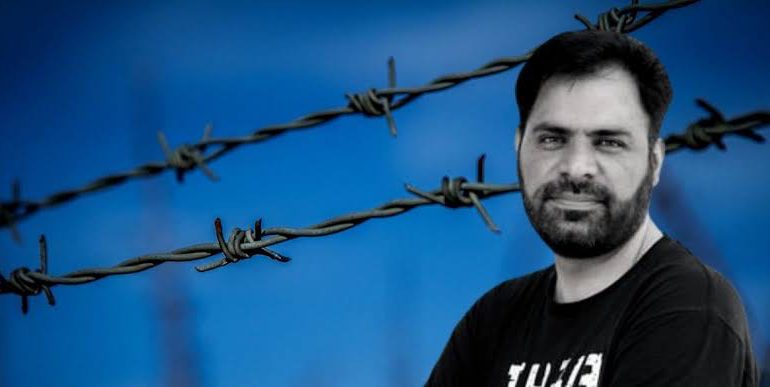The ongoing incarceration of human rights defender Khurram Parvez for over 1,000 days under UAPA charges showcases the severe crackdown on human rights advocacy in Jammu and Kashmir.
The abrogation of Article 370 of the Indian Constitution on 5 August, 2019 served as a medium to trample down the civil society and human rights defenders in Jammu and Kashmir. While the region has never been a haven for independent, unbiased journalism, the repression of media and civil society has only gotten more brazen after stripping the state of its special status and downgrading it into a Union Territory.
Khurram Parvez, the most prominent human rights defender, has time and again been targeted and silenced by the Indian government for documenting human rights violations in the region and seeking accountability for the said violations. He is the founding member of the Jammu and Kashmir Coalition of Civil Society (JKCCS) and the chairman of the Philippine-based Asian Federation Against Involuntary Disappearance, an international organisation that looks into forced disappearance in Kashmir and elsewhere in Asia. Parvez received the 2006 Reebok Human Rights Award and the 2023 Martin Ennals Award. He has also been named one of the 100 most influential people of 2022 by Time magazine. However, all of the accolades and international recognition could not stop Parvez from being incarcerated at the Rohini High Security Prison, New Delhi, for 1000 days and counting.
The National Investigation Agency (NIA) registered a case against Parvez in October 2020. On 22 November, 2021, the JKCCS office in Srinagar was raided, and Parvez was arrested on charges under the Unlawful Activities (Prevention) Act, (UAPA) 1967.
The most astounding fact about the case is the chargesheet, which cites two of the reports produced by his civil society organisation. The chargesheet claims the reports to be “false and fabricated” and tarnishing India’s image at the international level. By using the reports as evidence for the arbitrary detention of Parvez, the NIA criminalised human rights research and fact-finding, which otherwise is internationally recognised work. This can have alarming consequences for human rights organisations doing similar work elsewhere.
Whether any particular incident in the report is wrong, I don’t know. If you don’t agree with a particular incident, you give your alternate argument. But you can’t criminalise fact-finding as a whole
-Mihir Desai, senior counsel in the High Court of Bombay and Supreme Court of India.
While the region continues to be suppressed and the voices clamped down, the veil of normalcy is being propagated all over the mainstream media. Instead of taking accountability and investigating the claims of human rights violations, the authorities have arrested, manhandled, and intimidated those who have voiced their findings and sought justice. The press and civil society organisations in the region for decades have been the cornerstone of the Kashmiri public sphere and their pleas. The large-scale crackdown on these organisations has left the people of the region helpless and their atrocities quashed.
The fact of the matter is that human rights violations at the hands of security forces have been rampant in Kashmir for the past 30 years. That’s a fact. AFSPA and PSA have been used in a very discriminatory manner. People have been tortured. People have been encountered.
said Desai
One of the JKCCS reports, used as evidence for Parvez’s detention, was published in 2015. It aimed to investigate the role of the state in Jammu and Kashmir, which had resulted in more than 8,000 disappearances, 70,000 deaths, 6,000 unmarked mass graves, and countless cases of torture and sexual violence. NIA claimed that the said report was fabricated and gave away sensitive details regarding the military deployment. However, the report has been readily available on the internet since it was published. Instead of communicating with the organisation regarding the sensitive material back then, it is being used in a supposed terrorism case after nine years.
It is not the only time Parvez has been incarcerated. In 2016, one day after Parvez was impeded from travelling to Switzerland to attend the 33rd session of the United Nations Human Rights Council, he was arrested and charged under the Public Safety Act (PSA). Besides Parvez, several other Kahmiri journalists and human rights activists have abstained from travelling and collecting their awards.
Asif Sultan was unable to collect his Press Freedom Award from the American National Press Club in 2019 due to being imprisoned. Sanna Irshad Mattoo also could not collect her Pulitzer Prize due to the administrative orders restricting her from leaving Delhi in 2022. Further, Irfan Mehraj recently won the Human Rights and Religious Freedom Journalism Award while incarcerated with Khurram Parvez.
The systematic use of UAPA allows the Indian administration to chase down human rights defenders by mobilising the anti-terrorism discourse. This impunity, harnessed by the UAPA, has accelerated the demise of human rights in India, which can only be reversed with the amendment of the said law.
Khurram Parvez being arbitrarily detained for more than 1000 days and any voice of “dissent” being trampled before it is even heard is a testament to a flawed democracy. How normal is the normalcy when you have to silence the voices of people from within?
Read also: The Donkey Dance of UAPA: Criminalising Dissent in a Hollowing Democracy
Featured Image Credits: The Leaflet
Reeba Khan













